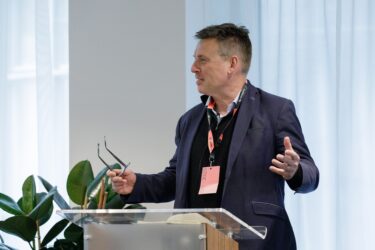
This blog was written by Anthesis CEO, Stuart McLachlan and is part 2 of a series of insights on this years’ Conference of the Parties 28 (COP28) in the United Arab Emirates.
What’s the role of journalists when it comes to processes like COP – or indeed in addressing the climate challenge more generally?
Funding and technologies tend to dominate the discussion of solutions, but we know without significant behaviour change any amount of money and kit will not be enough. Some intriguing new enablers of this behaviour change were on show in Dubai – one example being the launch of the Inner Development Goals, a kind of playbook for the person you need to be to navigate the transition and thrive afterwards. Part of the UNSDG process and worth a look, particularly if, like me, you struggle to stay calm reading the stream of contradictions coming at you from the media.
I think most people would agree responsible journalism is a vital enabler of the right kind of behaviour change. But it’s not always what we get, as messages about climate action fight for survival in a clickbait culture where the competition for engagement drives sensationalist headlines and stories that stoke division and doubt. In Dubai many were lamenting the uncomfortable relationship that journalism has with the truth. In one session, the rights and wrongs of the Guardian and other broadsheet headlines of the last 12 months were in the spotlight. What effect do ambivalent headlines such as “I love electric vehicles and was an early adopter, but increasingly I feel duped” or “For many hydrogen is the fuel of the future but new research raises doubts” have on readers’ appetite for change?
Contrasting views bouncing around from one week to the next – often from the same authors in the same media outlets leads to confusion and procrastination. Anyone who has worked to make nature-based solutions and offsetting live up to their potential will know first-hand how media coverage often conflates good and bad elements of a wide range of products to condemn the entire endeavour – with significant negative effects on a vital strand of short-term climate action.
Offsets desperately need honest, thorough reporting, something dear to our hearts at Anthesis and a topic I’ll come back to in a later post. And to be fair, trends in sustainability communications are not all bad: the progress now being made in Europe and the US on regulating product communications and corporate greenwashing will be a big step forward if it helps people feel confident making better choices. But it won’t be enough unless media organisations take a similarly disciplined approach to storytelling about the climate crisis and how we should act. Journalism’s first responsibility is to the truth, and I very much hope we will see a more consistent and sustained approach to some basic climate truths in the coming years.
We are the world’s leading purpose driven, digitally enabled, science-based activator. And always welcome inquiries and partnerships to drive positive change together.




